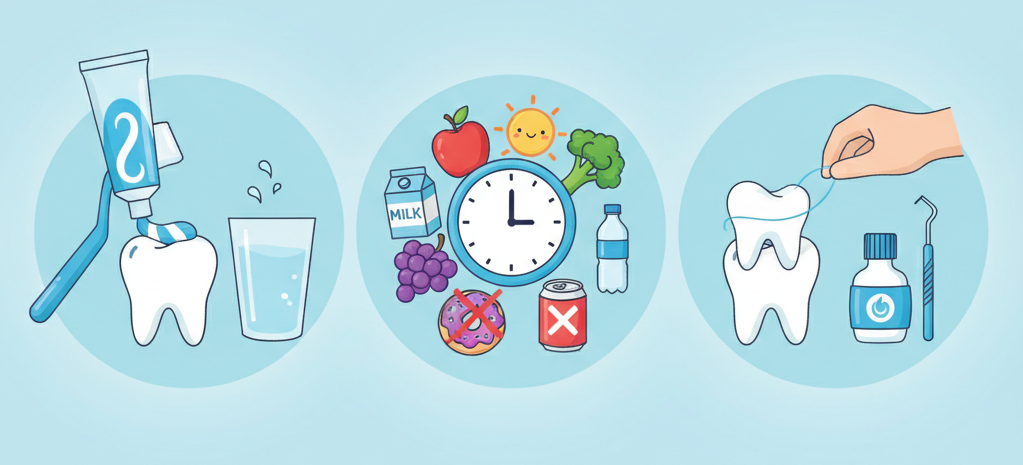Keeping your teeth and gums healthy takes more than just an occasional visit to the dentist. Cavities and gum disease are among the most common oral health issues, but they’re also highly preventable with the right care and habits. Understanding what causes these problems and how to stop them early can help you maintain a strong, confident smile for life.
Understanding Cavities and Gum Disease
Cavities occur when bacteria in your mouth produce acids that erode tooth enamel, leading to decay. Gum disease, on the other hand, develops when plaque builds up along the gumline, causing inflammation, bleeding, and in advanced cases, tooth loss. Poor oral hygiene, sugary foods, and skipping dental visits are among the biggest contributors to both conditions. The good news is that with consistent care, you can prevent most of these problems before they start.
Daily Oral Hygiene Habits That Make a Difference
Brushing twice a day with fluoride toothpaste is the foundation of good oral hygiene. Be sure to brush for at least two minutes, reaching every surface of your teeth, and replace your toothbrush every three months or sooner if the bristles are worn. Flossing once a day helps remove food particles and plaque between teeth where a toothbrush can’t reach. Using an antibacterial mouthwash can further reduce bacteria and freshen your breath, providing an extra layer of protection.
The Role of Diet in Oral Health
What you eat plays a significant role in preventing cavities and gum disease. Foods rich in calcium and vitamins, such as dairy products, leafy greens, and nuts, help strengthen tooth enamel. Crunchy fruits and vegetables like apples and carrots naturally clean your teeth as you chew. Limit sugary snacks and drinks, as sugar feeds the bacteria that cause plaque and decay. Staying hydrated throughout the day helps wash away food debris and keeps saliva levels healthy, which protects against bacteria.
Regular Dental Visits and Professional Cleanings
Even with the best home care, professional dental cleanings are essential. Dentists can remove hardened plaque (tartar) that can’t be eliminated with regular brushing and flossing. Regular check-ups every six months allow your dentist to detect early signs of decay or gum inflammation before they become serious. These visits also give you a chance to ask questions and get advice tailored to your oral health needs.
Staying consistent with these appointments is the best way to prevent sudden pain, but if an urgent issue does arise, it is reassuring to know you can quickly find an emergency dentist in Cleveland residents trust for immediate care. Prioritizing both preventive check-ups and prompt attention to discomfort ensures your teeth stay strong and functional for years to come.
Additional Preventive Measures
Aside from daily care, there are other effective ways to protect your teeth and gums. Treatments like dental sealants and fluoride applications provide added defence against cavities, especially for children and those prone to decay. Using interdental brushes or water flossers can make cleaning between teeth more effective, particularly for those with braces or dental restorations. If you experience dry mouth, drinking plenty of water and chewing sugar-free gum can help stimulate saliva flow. For ongoing care and advice, a trusted dentist Lane Cove can recommend the best preventive options based on your specific needs.
Signs You Might Have Early Gum Disease or Tooth Decay
It’s important to recognise the warning signs of oral health problems before they worsen. Red, swollen, or bleeding gums may indicate gingivitis—the early stage of gum disease. Persistent bad breath, tooth sensitivity, or visible holes in your teeth are also signs of decay. If your gums begin to recede or your teeth feel loose, you should see a dentist as soon as possible.
When to See a Dentist in Lane Cove
Regular visits to your local dentist help ensure your mouth stays healthy and free from disease. Professional cleanings, early diagnosis, and personalised care plans make a big difference in maintaining long-term oral health. If it’s been more than six months since your last check-up or you’ve noticed any signs of discomfort, schedule an appointment to get your oral health back on track.
Bringing It All Together
Preventing cavities and gum disease starts with good daily habits, a balanced diet, and regular professional care. Brushing and flossing consistently, eating tooth-friendly foods, and seeing your dentist regularly can help you avoid painful and costly dental problems. By staying proactive, you’ll not only protect your smile but also improve your overall health and well-being.












